Conference Presentations by Cansu Güleç
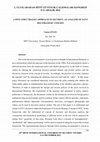
2. ULUSLARARASI HİTİT GÜVENLİK ÇALIŞMALARI KONGRESİ, 2022
One of the theoretical formations of post-positivist thought in International Relations is post-s... more One of the theoretical formations of post-positivist thought in International Relations is post-structuralism which became part of the literature in the 1980s. Post-structuralism claims a different position from the traditional realist and idealist perspectives in the field of security studies by offering the connection between national identity and security politics and the discursive character of the concept of security. Accordingly, the practices of security construct the national “self” by indicating the difference between itself and the “other”. In that sense, policy discourses are considered inherently social since the policy-making elite address the wider public sphere to institutionalize their understanding of the identities and policy options. Therefore, in order to understand the foreign and security policies of the actors involved in International Relations, the examination of the speeches and statements of policy makers, politicians or bureaucrats, the documents written by the institutions involved in foreign policy making has been an increasingly used as a method. In this context, official speeches, statements, parliamentary debates, diplomatic correspondence, interviews, newspapers, photographs and videos can be used in discourse analysis studies. The aim of this paper is to understand and situate NATO’s discourse within the framework of its recent Strategic Concept of 2022. In this framework, after the elaboration of concept of discourse and discourse analysis, the construction and hierarchical positioning of different actors in the text will be analyzed by asking “how” questions. In that sense, Roxanne Lynn Doty’s concepts of “presupposition”, “predication” and “subject positioning” will be used as analytical categories to provide a textual framework. The representational practices through which meaning are generated is crucial in this study. Accordingly, the discursive identities produced by NATO will be examined in order to understand the attachments to various social objects and subjects in international environment.
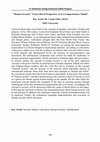
Uludağ Üniversitesi XI. Uluslararası İlişkiler Kongresi, 2019
Classical liberal ideas were built on the concepts of equality, rationality, freedom and property... more Classical liberal ideas were built on the concepts of equality, rationality, freedom and property. In the 18th century, Locke from England, David Hume and Adam Smith in Scotland, Montesque and Voltaire from France and Kant from Germany were the leading liberal thinkers. As an international theory that explained international politics and foreign policy, Liberalism emerged after the First World War. Names like Woodrow Wilson, Hobson, David Mitrany, Karl W. Deutsch, Michael Doyle, Francis Fukuyama, Stanley Hoffmann, Robert O. Keohane are among the most important representatives of liberal thought in international relations. According to Liberalism, world peace might occur with the residence of political and economic liberal norms at both national and international levels; the increase of interdependence and interaction; the international cooperation that carried out under the leadership of intergovernmental organizations; and the protection of human rights and governance. In security studies, the concept of human security is one of the most important concepts of the post-Cold War era that has been scholarly disputed. Indeed, the ethnic and religious-based conflicts after the Cold War led to evolution of the concept “national security” and the increase of the concerns about individual security in international relations. Since then, there have been attempts to “deepen and widen” the concept of security from the level of states to individuals. In that sense, the concept of “human security” considers human being as the reference object of security as well as it places the threats against human beings on the agenda. On the other hand, the mentioned concept objects the monopoly of the state in ensuring security through featuring the actors like international organizations and civil society. Accordingly, the concept of security will be discussed within the scope of liberal theory in this paper. Following the historical evolution, the conceptualizations about human security will be put forward. In addition, the criticisms toward the concept of human security will be analyzed. Finally, the evaluations regarding implementation and execution of human security will be discussed.
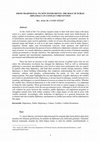
Uludağ Üniversitesi X. Uluslararası İlişkiler Konferansı, 2018
As the world of the 21st century requires states to deal with more issues with more actors in a m... more As the world of the 21st century requires states to deal with more issues with more actors in a more complex atmosphere, diplomacy has become much more multi-faceted. In today's global environment, many people in the world have easy and instant access to all kinds of information, and many of them have the ability to influence their governments' positions. In such environment, states need to undertake a wider set of issues like presenting abroad a state's national image and brand, as well as to put more emphasis on issues such as trade, finance, migration, human rights, and environmental concerns. Such openness and multi-level cooperation also necessitates the pursuit of more collaborative diplomatic relations with various types of actors. As a result, diplomacy cannot be considered only in terms of relations regarding central governments or foreign ministries. The diplomatic world involves more actors, which include regional and international organizations, multinational corporations, local and city government and influential individuals. There has been an increase in the number and activity of global actors who are not states; the information revolution has changed the diplomacy field as well as information gathering is concerned; and diplomacy now involves many more participants who are experts in matters other than diplomacy, and hold their positions outside foreign ministries. Public diplomacy is about building relationships that comprises understanding the needs of other countries, cultures and peoples, communicating the points of view and correcting misperceptions. This paper highlights the role and importance of public diplomacy for conflict prevention in international arena. Diplomacy is always based on dialogue, usually between two countries, and dialogue is a crucial element of success as a mean for resolving conflict. Whether the conflict has a historical dimension or is the result of current circumstances, it is important to bring the sides together. When governments do not want or cannot engage in dialogue, it is important to involve parties from the non-government sector. Although in itself will not be the sole solution for peace between the countries, public diplomacy can implement programs to strengthen mutual trust, both within countries with a high degree of risk and in areas with conflict potential. Accordingly, after definition of diplomacy in a general framework, the evolution and role of public diplomacy mechanisms in conflict prevention will be elaborated in this paper.
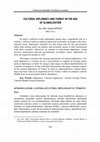
Uludağ Üniversitesi VII. Uluslararası İlişkiler Konferansı, 2015
In today's political world, diplomatic means play a significant role in a country's efforts to ac... more In today's political world, diplomatic means play a significant role in a country's efforts to achieve political goals and to promote its image in the international arena. Diplomatic channels are also being used by the governments rather than relying solely on military and economic means in their interactions with other countries. Moreover, in contrast to state-based diplomacy, which involves interactions between governments, nowadays, states' diplomatic efforts are targeted at people as well. This paper examines the concept and practice of cultural diplomacy. Cultural diplomacy is carried out by a government to support its foreign policy goals or diplomacy-or both-by using a wide range of cultural manifestations for a number of purposes. In line with these discussions, the paper examines aspects of the cultural diplomacy of Turkey in order to understand how cultural diplomacy has been used as an important tool by Turkey within its relations with the Middle East in recent period with its limitations.
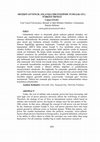
V. ULUDAĞ ULUSLARARASI İLİŞKİLER KONFERANSI, 2013
Günümüzde askeri ve ekonomik gücün maliyeti giderek artmakta, söz konusu güç uygulamaları... more Günümüzde askeri ve ekonomik gücün maliyeti giderek artmakta, söz konusu güç uygulamalarının maliyetinin yüksek oluşu milletlerin refahını da olumsuz etkilemektedir. Bu nedenle, uluslararası sistemdeki askeri ve ekonomik güce dayalı güç kullanma stratejisi özellikle 20. yüzyılın son çeyreğinden itibaren değişikliğe uğramaya başlamıştır. Yumuşak güç kavramı bu arayış kapsamında ABD’li bilim adamı Joseph S. Nye tarafından ortaya atılmış olmakla birlikte, yumuşak güç uygulamaları farklı aktörler içinde de kurgusal olarak yer bulmuştur. Bu kurgu içinde yumuşak güç siyasi, ekonomik, sosyo- kültürel unsurların dış politikada sonuç alıcı işlevler edindiği mekanizmalar doğurmuştur. Genel olarak tanımlandığında, yumuşak güç istediğiniz bir şeyi kaba güç kullanarak değil, başkalarının sizin hedeflerinizi kabul etmesini sağlayarak elde etmenizdir. İster büyük ister küçük olsun, bütün ülkeler için sert güç askeri ve ekonomik kaynaklardan meydana gelmektedir. Öte yandan yumuşak güç ise kaynağını büyük oranda o ülkenin kültürü, değerleri ve politikalarının meşruiyetinden almaktadır. Bu bağlamda, bu çalışmada, günümüz dünyasında önemli bir konu olarak karşımıza çıkan yumuşak güç kavramı çerçevesinde Türk dış politikasında yumuşak gücün yeri incelenecektir. Bu hususlar dahilinde, öncelikle değişen güvenlik anlayışı çerçevesinde “yumuşak güç” kavramı incelenecek, Türkiye’nin yumuşak güç kurgusu ve bunun mekanizmaları ortaya konulmaya çalışılacaktır.
Papers by Cansu Güleç

Bu tez, Adalet ve Kalkınma Partisi dönemi dış politikasının söylemler üzerinden nasıl inşa edildi... more Bu tez, Adalet ve Kalkınma Partisi dönemi dış politikasının söylemler üzerinden nasıl inşa edildiğini temel alan kavramsal çerçeveden hareketle, AKP yönetici elitinin Türk dış politikasında ortak tarihi ve kültürel referanslar üzerinden ürettikleri “düzen kurucu” ve “sorun çözücü” söylemin bölgesel çatışmalarda nasıl yorumlanarak inşa edildiğini araştırmaktadır. Bu çerçevede, 2008 yılındaki “Gürcistan-Rusya Savaşı” ile 2008 “İsrail ile Filistin arasında yaşanan Gazze Savaşı” örnek olayları çerçevesinde bir araştırma yapılmıştır. Araştırma konusu olarak bu iki ayrı bölgesel çatışmanın seçilmesinin nedeni, aynı dönemlerde birkaç ay arayla ancak birbirlerinden farklı bölgesel coğrafyalarda yaşanan krizlere karşı Türkiye’nin “sorun-çözücü” ve “düzen kurucu” söylemlerinin işlerliğinin nasıl yansıtıldığını anlamaya çalışmak olmuştur. Bu amaçla ilk olarak, Dış Politika kavramı incelenmiş ve Dış Politika Analizinin tarihsel gelişimi ortaya konulmuştur. Temel olarak birey, devlet, sistem olm...

Perceptions: Journal of International Affairs, 2021
The main objective of this paper is to explain and interpret the evolution of NATO's public diplo... more The main objective of this paper is to explain and interpret the evolution of NATO's public diplomacy efforts in terms of the opportunities and limitations of today's globalized environment. Public diplomacy refers to the efforts of states and non-state actors to better explain their values to the world. It concentrates particularly on "soft power" tools, such as science, art, culture, sports and media that enable interaction between societies. Because NATO is widely associated with security and defense issues, it is important to understand how it responds to the developments of today's diplomatic trends with its own public diplomacy and communication activities. As technology continues to change and evolve, NATO's communication strategies have faced new types of networks and platforms. Now celebrating its 72 nd anniversary, the Alliance seeks to embrace and implement a contemporary communication policy with new mechanisms. Within this framework, this paper will provide a definition of the concept of public diplomacy, and explore the historical evolution of NATO's public diplomacy agenda. NATO's coordination activities and values, practical means of communication and their expected impact will be discussed.

ÇOMÜ Uluslararası Sosyal Bilimler Dergisi, 2018
Dış Politika Analizi (DPA) alanında çalışmalar yapan araştırmacılar, karar alma sürecini etkile-... more Dış Politika Analizi (DPA) alanında çalışmalar yapan araştırmacılar, karar alma sürecini etkile-dikleri sürece bütün analiz düzeylerinden elde edilebilecek açıklayıcı değişkenlerden faydalan-maktadırlar. DPA'nın ilgi alanı başta devletler olmak üzere çeşitli coğrafyalarda karşımıza çıkan çeşitli aktörlerin birbirleriyle etkileşimini incelemek olarak tanımlanabilir. Bu bakış örgütleri, kurumları, partileri, kültürel oluşumları ve bunları oluşturan insanları odağa yerleştirmektedir. DPA bakımından bu etkileşimin en önemli unsuru olarak karar vericiler, başka bir ifadeyle bi-reyler, kabul edilmektedir. Ancak, söz konusu bireylerin rasyonel varsayılması, sosyal bağlam, inanç, algılama, istek gibi niteliklerin görmezden gelinerek mekanik bir sürece oturtulması sonucunu da beraberinde getirebilir. Bu sebepten bu çalışmada, birey odaklı analiz temele alınmakla beraber, sosyal yapıları da bir ölçüde analize dahil eden bir yaklaşım ortaya konma-ya çalışılacak, dış politika kararlarının oluştuğu bürokratik süreçler de incelenerek kurumlar dışlanmayacaktır. Bu makalede, temel olarak birey, devlet, sistem olmak üzere üç analiz dü-zeyine değinildikten sonra, DPA'da Karar Verme Modelleri'ne ilişkin bir analiz ortaya koyula-caktır. Söz konusu inceleme, siyasal karar alma konusunda hangi modellerin geliştirildiğini ve hangi modelin uygulanabilir olup olmadığını çeşitli yönleriyle anlayabilmeyi amaçlamaktadır. Abstract Scholars studying in the field Foreign Policy Analysis (FPA) make use of explanatory variables that can be obtained from all levels of analysis as long as they influence the decision making process. The field of interest of the FPA can be defined as analyzing the interactions of the various actors, primarily states, in various geographies. This perspective mainly focuses on organizations, institutions, parties, cultural formations and human beings who give life to them. In that sense, FPA regards decision makers, in other words individuals, as the most important component of this interaction. However, the assumption of the individual as a rational actor can bring about a result of fitting into a mechanical process through ignoring such qualities as social context, belief, perception and desire. Therefore, in this study although individual level of analysis will be centered on, it would also be sought to put forward an approach involving analytical analysis of social structures in a certain extent; and institutions will not be excluded through examining the bureaucratic processes of foreign policy making. In this article, after mentioning three levels of analysis as individual, state, and system, Decision Making Models in FPA would be analyzed. The purpose of this study is to understand which models have been developed about political decision making and which model is feasible in various aspects.

Güvenlik Stratejileri, 2015
The conflict between Armenian and Azerbaijan around Nagorno-Karabakh was violent between 1988 and... more The conflict between Armenian and Azerbaijan around Nagorno-Karabakh was violent between 1988 and 1994. Nevertheless, Nagorno-Karabakh dispute is regarded as one of the frozen conflicts, which has been witnessed for many years. In order to stop and contain the conflict, other states and international organizations advocated peaceful settlement. However, the problem went through a number of phases and has not reached a final solution despite of many years of negotiation under the auspices of the OSCE Minsk Group. In this context, the objective of this paper is to understand the main impeding factors that prevent peaceful resolution and establishment of a long-lasting peace for Armenia. As a framework to analyze the case of Armenia-Azerbaijan dispute over Nagorno-Karabakh, this paper uses the “constructivist theory”, which explains national histories and identities as fluid, evolving, and formed over time, and which claims that it is mainly social relationships between agents, structures, and institutions that can lead to ethnic conflicts. Contrary to the primordialist approach, which treats ethnic groups as concrete and independent entities that exist inherently, the explanation of intractability within a constructivist framework constitutes the maindifference. In view of this, government policies are also constructed according to interstate perceptions, expectations and the concepts developed towards themselves and others. As a result, rather than only including one-dimensional “ancient hatred” paradigm; “the problem of security”, “image of enemy”, “other countries” involvement with having interests in the region”, and most importantly “internal politics” can be regarded as the contributors to intractability for Armenia.

Tesam Akademi Dergisi, 2015
Küreselleşmenin insani boyutu olarak adlandırılan göçün devletlerin kültür, ekonomi ve siy... more Küreselleşmenin insani boyutu olarak adlandırılan göçün devletlerin kültür, ekonomi ve siyasetlerinin üzerinde geniş etkileri bulunmaktadır. Küreselleşme ile beraber dünyadaki göç hareketleri yoğunlaşmış, hem yasal göç hem yasadışı göç hem de iltica hareketlerinin sayısı büyük rakamlara ulaşıp daha çok ülkeyi kapsar duruma gelmiştir. İkinci Dünya Savaşı’nın ardından, ortak ekonomik politikalar gerçekleştirmek amacıyla başlayıp gittikçe siyasi bir oluşuma doğru hareket etmekte olan Avrupa Birliği’nin yüz yüze kaldığı en önemli sorunlardan bir tanesi de Birlik topraklarına dışarıdan yönelen göçtür. Gerek tarihi gerekse coğra�i konumu itibarı ile bir göç kavşağında yer alan bir ülke olarak görülen Türkiye ise 2000’li yıllara kadar kapsamlı bir göç politikası oluşturamamıştır. Bu çalışmada Avrupa Birliği’nin ve Türkiye’nin göç politikalarında kat ettikleri yol tarihsel arka plan ışığında ele alınacaktır. Bununla beraber, AB’ye tam üyelik sürecinin etkisine rağmen, Türkiye’nin de uzun vadeli gelişmeleri inceleyerek gere
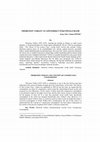
Erciyes University Journal of the Institute of Social Sciences, 2015
Thorstein Veblen (1857-1928), Amerika’nın ürettiği en bilinen ve etkili sosyal düşünür ve e... more Thorstein Veblen (1857-1928), Amerika’nın ürettiği en bilinen ve etkili sosyal düşünür ve eleştirmenlerinden biri olarak kabul edilmektedir. İlk kez 1899’da yayımlanan kitabı “The Theory of The Leisure Class” (Aylak Sınıfı Teorisi) adlı eserinde Veblen, tüketimin gösteriş amacı ile de yapılabildiğini ileri sürmüş, toplum-ekonomi arasındaki ilişkiyi sınıfsal farklılaşmalara da dayandırmıştır. Bu çerçevede Veblen, gösterişçi tüketimin üst sosyal sınıf ve bunlara benzemeye çalışan diğer sınıflar tarafından gösteriş amaçlı olarak yapılan alışverişler olduğunu belirtmiştir. Veblen’in yaşadığı dönemden bu yana genel olarak toplumsal dünyanın ve daha özgül olarak tüketim dünyasının büyük ölçüde değiştiği açıktır. Ancak bugünün aşırı-tüketim dünyasına dair bir bakış açısı kazanmak için Veblen’in fikirlerini tekrar etmek önemli bir referans noktasıdır. Bu hususlar dahilinde bu çalışmanın amacı, “gösterişçi tüketim” kavramının Veblen’in bahsettiği çerçeveden günümüz koşullarında nasıl bir boyut kazandığını anlamak olacaktır.
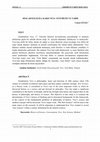
Dokuz Eylül University Journal of Humanities , 2015
Giambattista Vico, 17. Yüzyılın bilimsel devrimlerinin gerçekleştiği ve bunların etkilerinin güçl... more Giambattista Vico, 17. Yüzyılın bilimsel devrimlerinin gerçekleştiği ve bunların etkilerinin güçlü bir şekilde devam ettiği 18. yüzyılın düşünürü, hukukçusu ve tarihçisidir. Vico'nun tarihi bir bilim olarak ele aldığı ve onun ilkelerini ortaya koyduğu Yeni Bilim bir yapıt olarak düşünce tarihinin en önemli eserlerinden biri olarak kabul edilmektedir. Vico düşünce tarihine önemli katkılarda bulunmuş, tarih felsefesi ve tarih bilimine yenilikler ve özgün düşünceler getirmiştir. Bu çalışma Vico'nun tarih düşüncesini ve onun düşünsel arka planını belirleyen etkenleri incelemeyi amaçlanmaktadır. Bu çerçevede, tarih felsefesinin temel problemleri bağlamında, Vico'nun bilim ve yöntem kavramlarına değinilecektir. Vico'nun temel eseri olan "Yeni Bilim" araştırmada ana kaynak olarak kullanılacaktır. Vico'nun doğa bilimlerinin hakim olduğu bir yüzyılda, "yeni bilimi" nasıl ortaya koymak istediğini anlamak da önem taşıyacaktır.
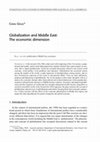
THE MALOPOLSKA SCHOOL OF ECONOMICS IN TARNÓW RESEARCH PAPERS COLLECTION, 2013
In the last part of the 20th century and in the beginning of the 21st century, a popu- larized an... more In the last part of the 20th century and in the beginning of the 21st century, a popu- larized and equally controversial phenomenon has marked, and has had a great impact on soci- eties, that is named globalization, which has occupied discussions related to the current world economy, world politics, local problems and responses. Globalization has increased contact among the peoples of the world, a rapid expansion of interdependence among nations; and we have witnessed an explosion of new actors in international affairs. There are many definitions, opinions and dimensions of globalization. Yet, for the purpose of this study, the paper will try to analyze the economic domain rather than political and cultural dimensions of this popular phe- nomenon with particular reference to Middle Eastern countries. Economic and financial globali- zation and the expansion of world trade have brought substantial benefits but also inequalities to countries around the world. In the framework of this argument, the paper analyzes the concept of globalization and processes of globalization particularly focusing them from economic perspec- tive. It then concerns with the effects of the economic globalization in Middle East region, and argues the main impediments for greater integration into global economy.







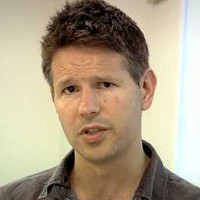


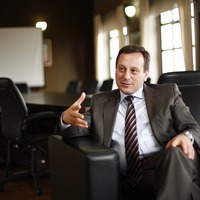
Uploads
Conference Presentations by Cansu Güleç
Papers by Cansu Güleç